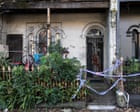
In recent days, two markedly different stories have drawn significant attention from Sydney and Gaza, offering a glimpse into the challenges and hopes present in these regions. In Sydney, a somber discovery reveals the quiet struggles of individuals, while in Gaza, efforts for peace and relief continue amid ongoing strife.
In an unsettling discovery in Sydney, the bodies of two men were found in a deteriorating terrace in Surry Hills. The landlord, Eleanor Barker, who has owned the property since the 1980s, raised concerns about one of her tenants’ welfare, prompting a police visit. Upon their arrival at Cleveland Street, they discovered both men in advanced stages of decomposition. This situation sheds light on the challenges of isolation and, perhaps, unnoticed struggles within bustling urban environments. The house had been rented to the duo for around ten years, yet their passing went unnoticed for what might have been several weeks.
Meanwhile, in Gaza, an ongoing conflict reaches another pivotal moment as discussions of a potential ceasefire emerge. Despite renewed airstrikes from Israel, Hamas has expressed readiness to engage in US-sponsored negotiations for a temporary cessation of hostilities lasting 60 days. Such discussions inject a cautiously optimistic note into the nearly 21-month-long conflict, offering a glimmer of hope for a pause in the violence. The prospect of diplomatic dialogue highlights the humanitarian need for a break in the cycle of violence, providing an opportunity for the recalibration of longer-term peace strategies.
This potential pause in hostilities is crucial, particularly when considering the dire humanitarian situation in Gaza, exacerbated by the ongoing conflict. Doctors in the region have raised alarms about the severe shortage of baby formula, which threatens the lives of hundreds of infants. With maternal malnutrition and fatalities hindering breastfeeding capabilities, the lack of formula becomes a life-threatening issue. Dr. Ahmad al-Farra from Nasser Hospital, Khan Younis, reported that supplies are running critically low, pushing healthcare providers to ration what little they have left.
In both Sydney and Gaza, these narratives intersect at the human level, emphasizing the importance of attention, care, and communication in addressing unnoticed suffering. The Sydney incident reminds us of the critical need for community awareness and support systems to ensure individual’s well-being isn’t overlooked. In contrast, the potential ceasefire and urgent need for humanitarian aid in Gaza underline the intricate link between active conflict resolution and the delivery of essential services to embattled regions.
As we reflect on these stories, it becomes clear that while the settings and scenarios differ vastly, the common thread remains the immense value of human connection and compassion. Whether through fostering active diplomacy or strengthening community vigilance, the goal remains the same: to alleviate suffering and nurture the bonds that hold society together. Amid the turmoil and uncertainty, these efforts offer a backdrop of hope and resilience, underscoring the enduring human spirit.
Source: {link}
